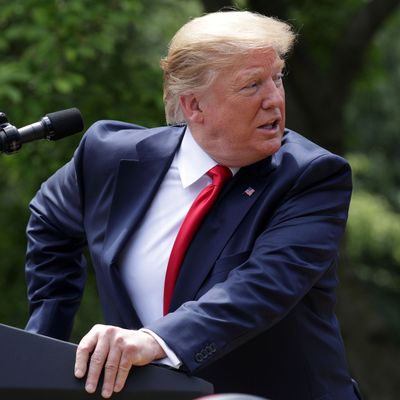
Late in the 2016 campaign, the New York Times revealed that Donald Trump had claimed a $916 million loss on his 1995 tax return, and, as a result, had likely paid little-to-no income taxes in the decades since.
At the final presidential debate, Hillary Clinton argued that her billionaire rival’s freeloading was outrageous. And the Republican nominee did not disagree.
“We’re entitled because of the laws that people like her passed to take massive amounts of depreciation on other charges, and we do it,” Trump explained. “And all of her donors — just about all of them — I know Buffett took hundreds of millions of dollars, Soros, George Soros, took hundreds of millions of dollars … And you know, Hillary, what you should have done, you should have changed the law when you were a United States senator … You should have changed the law. But you won’t change the law, because you take in so much money.”
This was a variation on one of Trump’s favorite counterattacks: His serial abuse of America’s tax laws and campaign-finance system only proved that he was a savvy businessman, and that his opponents were all corrupt or incompetent “career politicians.” After all, his job had been to win the rat race; their job was to write its rules. Don’t hate the player, hate the league commissioner. “My whole life I’ve been greedy, greedy, greedy,” Trump confessed at an early Republican debate. “But now I want to be greedy for the United States.” The NSA recruits master hackers to fix the gaps in U.S. cybersecurity — so who better than a master tax cheat to close our code’s unjust loopholes?
At the time, this was a decent comeback. Today, it is not.
On Tuesday, the New York Times revealed that between 1985 and 1994, “Mr. Trump appears to have lost more money than nearly any other individual American taxpayer,” according to newly uncovered IRS transcripts. In total, the mogul suffered some $1.17 billion in losses over the decade, as failed business venture (and subsequent bailout from daddy) piled on top of failed business venture (and subsequent bailout from daddy).
In response, the president has decided to once again reframe evidence of his entrepreneurial incompetence as proof of the tax code’s brokenness.
“The president got massive depreciation and tax shelter because of large-scale construction and subsidized developments,” a senior White House official told the Times in a statement. “That is why the president has always scoffed at the tax system and said you need to change the tax laws. You can make a large income and not have to pay large amount of taxes.”
The president is right to scoff. In the U.S., commercial real-estate owners can write off the depreciating value of their buildings — even when those properties are, in actual fact, appreciating in value due to the increasing desirability of the land on which they sit. It’s an indefensible provision that, among other things, allows many landlords to pay no taxes on their rental income.
But there are a couple of obvious problems with the White House’s line of defense. One is that depreciation can only account for a small fraction of the extraordinary losses Trump posted. The other, more fundamental one, is that Donald Trump already passed a sweeping “reform” of America’s tax code, which not only preserved the “massive depreciation and tax shelter” loopholes he benefited from, but actually expanded them.
And yet, the president is so attached to his “the tax code is the real scandal” talking point, he doubled down on it Wednesday morning.
Trump’s defense here is arguably more damning than the Times’ allegations. In theory, there’s no reason why a bad businessman can’t go on to become a good president. But a commander-in-chief whose signature legislative achievement expanded tax loopholes that he himself describes as grossly unfair is pretty much a bad president, by definition.
What he should do, he should change the law. But he won’t change the law, because he takes in so much money.






























